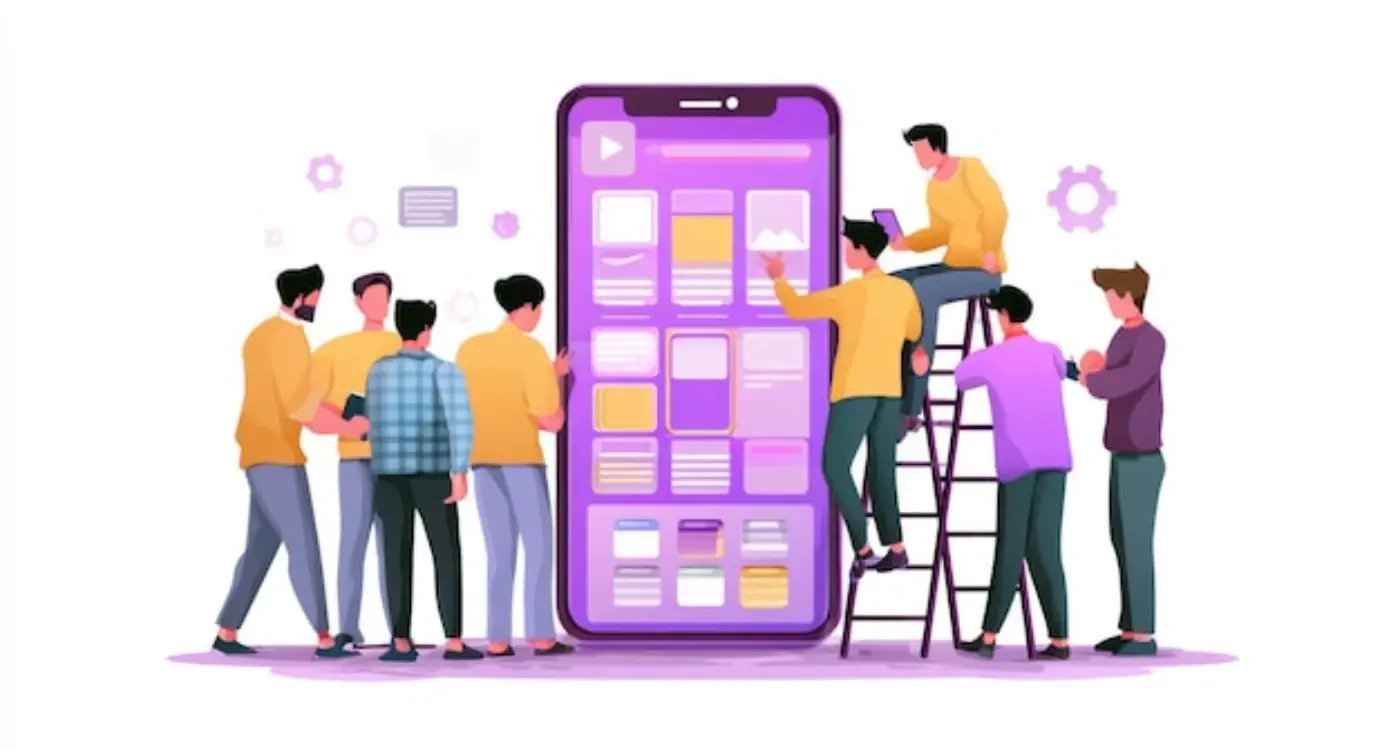What Onboarding Steps Set New Developers Up for Success?
New developers starting at your agency often spend their first few weeks feeling lost, clicking through documentation they don't understand, and trying to figure out who to ask for help without looking completely clueless. I've watched talented developers—people who aced their interviews and had impressive portfolios—struggle for months simply because nobody took the time to properly introduce them to how we actually work.
The thing is, most agencies treat developer onboarding like it's just about getting someone's laptop set up and giving them access to the code repository. But that's missing the point entirely. Good developer onboarding isn't just about technical setup; it's about helping someone understand your team's rhythm, your clients' expectations, and how their work fits into the bigger picture of building successful mobile apps.
A developer who understands the why behind your processes will always outperform someone who just follows instructions
When I started Glance eight years ago, we learned this lesson the hard way. Our first few hires took months to become productive members of the team, and honestly, some never quite got there. We were throwing people into projects without context, expecting them to figure out our coding standards by osmosis, and wondering why they seemed disconnected from the work. These days, our new developers are contributing meaningfully to client projects within their first few weeks—not because they're necessarily better developers, but because we've built a system that sets them up for success from day one. The difference isn't just about productivity; it's about creating an environment where talented people can do their best work while feeling confident and supported.
Getting the Technical Environment Ready
Right, let's talk about the technical side of things—because honestly, nothing kills a new developer's enthusiasm faster than spending their first week trying to get their local environment working properly. I've seen brilliant developers get frustrated and leave companies simply because nobody took the time to set up their technical onboarding properly.
The first thing you need is a proper setup checklist. Not just a rough list someone scribbled down, but a detailed step-by-step guide that covers everything from IDE installation to database connections. And I mean everything—don't assume they'll know which version of Node.js you're using or where to find the staging server credentials.
Environment Setup Checklist
- Development tools installation (IDEs, version control, package managers)
- Access credentials for all necessary systems and repositories
- Local database setup with sample data
- API keys and environment variables configuration
- Testing frameworks and continuous integration setup
- Documentation access and internal wiki accounts
Here's what I've learned works best: pair them with someone technical for their first setup session. Don't just hand over a document and hope for the best. Having a buddy there means they can ask questions in real-time and you'll spot any gaps in your documentation.
Also, test your setup process regularly with fresh machines—what works on your laptop might not work on theirs. I always keep a clean virtual machine around just for testing our onboarding process. It's saved me countless headaches over the years.
Code Access and Security
Getting repository access sorted early is crucial, but don't forget about the security side of things. Set up their SSH keys properly, make sure they understand your branching strategy, and give them read access to relevant documentation repositories. Nothing's worse than a new developer who can't actually see the code they're supposed to be working on!
Building Strong Team Connections
Getting a new developer to write good code is one thing—helping them feel like they belong is something else entirely. I've seen brilliant developers struggle not because they couldn't handle the technical challenges, but because they felt isolated from their team. And honestly, that's on us as the people managing the developer onboarding process.
The first week is when most of the magic happens in terms of team integration. Your new hire is figuring out who to ask for help, whose coding style to follow, and where they fit in the team dynamic. Make this easier by pairing them with a buddy—not their manager, but a peer who can answer the "stupid" questions and explain the unwritten rules.
But here's what I've learned after years of watching new hire processes succeed and fail: social connections matter just as much as technical ones. Include your new developer in team lunches, coffee breaks, and yes, even those random conversations about weekend plans. These moments build trust faster than any formal meeting ever will.
Making Introductions That Actually Matter
Don't just introduce people by their job titles—explain how they'll actually work together. Instead of "This is Sarah, she's our QA lead," try "This is Sarah, she'll be reviewing your code submissions and can help you understand our testing requirements." It gives context that helps relationships form naturally.
Schedule informal one-on-ones with different team members during the first two weeks. Thirty minutes each, focused on getting to know each other rather than work tasks. The investment pays off when your new developer knows exactly who to approach for different types of help.
Team integration isn't just about being friendly—it's about creating the support network that helps developers succeed long-term. When people feel connected, they're more likely to ask questions, share ideas, and stick around when things get challenging.
Right, so your new developer has their laptop set up and they've met the team. Great start! But here's where things get interesting—they need to understand how you actually build things around here. And I mean really understand it, not just get a quick overview that leaves them guessing for weeks.
Every development team has its own rhythm. Some teams love long planning sessions before writing any code; others prefer to jump straight in and figure things out as they go. Neither approach is wrong, but your new starter needs to know which camp you're in. I've seen brilliant developers struggle simply because they were used to a different way of working.
Walking Through Your Workflow
Start with the basics—how do ideas become actual features? Do you use Agile sprints, Kanban boards, or something completely different? Show them where tickets come from, who decides what gets built next, and how priorities change (because they always do). Don't just tell them about your process; let them shadow someone through a complete cycle. Watch a user story go from conception to deployment.
Your code review process is probably the most important thing they'll need to master. Some teams are quite relaxed about reviews; others have strict standards that would make a university professor proud. Either way is fine, but your new developer needs to know what's expected. Show them examples of good pull requests and ones that needed work.
The Unwritten Rules Matter Most
Here's something most companies get wrong—they document the official process perfectly but forget about all the little unwritten rules that actually make things work. Like when it's okay to push a quick fix without a full review, or who to ask when you're stuck on something tricky. These informal processes often matter more than the official ones, but nobody thinks to explain them properly.
Learning the Codebase and Architecture
Right, so your new developer has their environment set up and they've met the team. Now comes the bit that can make or break their first few weeks—getting to grips with your actual code. I've seen too many talented developers struggle because they were thrown into the deep end without proper guidance on how your app actually works under the hood.
Start with the big picture first. Don't dive straight into individual files; instead, show them the overall architecture. How does your app structure its data flow? What design patterns are you using? Are you following MVP, MVVM, or something else entirely? I always create a simple diagram that shows how the main components talk to each other—it's honestly one of the most valuable things you can give someone new.
Code Documentation That Actually Helps
Your documentation needs to be practical, not theoretical. I mean, nobody wants to read a novel about why you chose a particular library three years ago! Focus on the stuff that matters: where to find key features, how your API integration works, and any quirky workarounds that aren't immediately obvious from the code itself.
The goal isn't to memorise every line of code—its to understand the thinking behind the structure so you can contribute meaningfully from day one.
Pair them up with someone who knows the codebase well for their first few tasks. Not everything needs to be explained through documentation; sometimes a quick chat about why something was built a certain way is worth more than pages of written explanation. And please, give them something small but meaningful to work on within their first week—nothing builds confidence like successfully shipping a feature, even a tiny one.
Setting clear expectations from day one isn't just helpful—it's absolutely critical for new developers. I've seen brilliant developers struggle and eventually leave teams simply because nobody took the time to explain what success actually looked like in their role.
When a new developer joins your team, they're basically trying to decode an entire company culture whilst learning your specific processes. Without clear guidelines, they'll spend weeks second-guessing themselves instead of building confidence. That's why I always sit down with new team members within their first few days and map out exactly what we expect from them in weeks one, two, and beyond.
Define Success Metrics Early
Don't leave performance expectations to guesswork. Be specific about what "good work" looks like in your environment. Is it clean, well-documented code? Meeting sprint commitments? Asking questions when stuck? Actually, that last one is huge—many new developers think asking questions makes them look incompetent, when really it shows they're engaged and want to do things properly.
I like to break down expectations into technical skills, communication patterns, and team contribution. For the first month, technical expectations should be realistic—you're not expecting them to architect entire features, but you do want them contributing meaningful code and following your team's standards.
Set Realistic Timeline Goals
Every new developer wants to prove themselves quickly, but rushing leads to mistakes and frustration. I typically tell new team members they should expect to feel genuinely productive around the six-week mark, not week two. This takes the pressure off and lets them focus on learning rather than trying to impress everyone immediately.
Regular check-ins during the first few months help keep expectations aligned. Things change, priorities shift, and what seemed important on day one might not matter by week four.
Creating Effective Feedback Systems
Here's the thing about feedback in developer onboarding—most companies get it completely wrong. They either dump everything on new hires in their first week or wait months before giving any meaningful input. I've seen brilliant developers lose confidence because nobody told them they were doing well, and I've watched others struggle for ages because no one mentioned they were heading in the wrong direction.
Good feedback systems start from day one, but they need to be structured properly. You can't just tell someone "you're doing great" and expect that to help them grow. New developers need specific, actionable feedback that connects directly to their work and your team's expectations.
Building Regular Check-ins
Weekly one-to-ones during the first month are absolutely crucial. Not just "how are you getting on?" conversations, but proper structured discussions about what they've learned, what's confusing them, and where they need support. I usually recommend a simple format: what went well this week, what was challenging, and what they want to focus on next week.
The key is making these conversations safe spaces. New developers won't tell you they're struggling if they think it reflects badly on them. Create an environment where asking questions is celebrated, not seen as a weakness.
Code Review as Learning
Code reviews are goldmines for feedback, but only if you do them right. Instead of just pointing out what needs fixing, explain why. Share the reasoning behind your suggestions. This turns every code review into a learning opportunity rather than just a quality gate.
Set up automated feedback collection through short weekly surveys during the first three months. Simple questions like "How supported did you feel this week?" give you data to spot problems before they become bigger issues.
Remember, feedback works both ways. Ask new developers what they think could be improved about your onboarding process. They're seeing it with fresh eyes, and their insights can help you refine the experience for future hires.
Supporting Professional Growth
One thing I've noticed after years in this industry is that the developers who thrive aren't necessarily the ones with the most technical skills from day one—they're the ones who never stop learning. When you're onboarding new team members, you need to set up systems that support their growth from week one, not just their immediate productivity.
Creating clear learning paths is absolutely vital. I mean, you can't just throw someone into the deep end and hope they figure it out. Each developer should understand what skills they need to develop, what technologies they should familiarise themselves with, and how their role might evolve over the next six to twelve months. This isn't just about being nice—it's good business sense because skilled developers build better apps.
Building Learning Into Daily Work
The best growth happens when learning is built right into the work itself, not tagged on as an afterthought. Pair programming sessions, code reviews, and technical discussions should all be framed as learning opportunities rather than just quality checks. Actually, some of my most productive developers started out struggling with certain concepts but had mentors who took time to explain the why behind decisions, not just the what.
- Schedule regular one-on-one sessions focused on career development
- Provide access to learning resources like courses, books, or conference talks
- Create opportunities for developers to work on different parts of the codebase
- Encourage attendance at local meetups or industry events
- Set aside time for experimental projects or new technology exploration
Remember, supporting growth isn't just about technical skills. Communication, project management, and understanding user needs are all part of becoming a well-rounded developer. The developers who can bridge the gap between technical implementation and business goals? They're the ones who end up leading teams and driving real impact.
Measuring Onboarding Success
Right, so you've put all this effort into creating a solid developer onboarding process—but how do you actually know if its working? I mean, you could have the most beautifully designed process in the world, but if your new hires are still struggling three months in, somethings not right.
The thing is, measuring developer onboarding success isn't just about whether someone can push code on day one. Sure, that's important, but the real indicators run much deeper. I always tell teams to look at time-to-first-meaningful-contribution—not just when they commit their first line, but when they're actually solving real problems independently. For most developers, this should happen within 4-6 weeks if your onboarding process is solid.
Key Metrics That Actually Matter
Retention rates tell you everything, honestly. If developers are leaving within their first six months, your onboarding probably isn't setting them up for success. But here's what I find really telling—peer feedback scores. When you ask existing team members how well integrated new hires feel after 60 days, you get genuine insight into whether your team connection efforts are working.
Code review feedback is another goldmine of data. Are new developers getting the same types of comments repeatedly? That suggests gaps in your codebase training. Are they asking the same questions everyone asks? Time to update your documentation.
The best onboarding processes create confident developers who feel empowered to ask questions, make mistakes, and contribute meaningfully from day one
Don't forget the soft stuff either—confidence surveys, one-on-one feedback sessions, and tracking how quickly new hires start participating in team discussions. These human elements often predict long-term success better than any technical metric. After all, great developers need to feel like they belong, not just that they can code.
Getting new developers up to speed isn't rocket science, but it does require genuine commitment from everyone involved. I mean, you can't just throw someone at a codebase and hope for the best—though I've seen plenty of companies try that approach over the years!
The most successful onboarding experiences I've witnessed share a few common threads. They start before day one with proper environment setup; they focus heavily on human connections rather than just technical knowledge; and they treat learning as an ongoing process, not a checkbox exercise. Actually, the teams that nail this stuff tend to see new hires contributing meaningful code within weeks rather than months.
But here's what really matters—measuring your success. You know you've got it right when new developers feel confident asking questions, when they're pushing code without hand-holding, and when they stick around long enough to help onboard the next person. That last bit is huge because developer turnover is bloody expensive, especially in today's market.
The mobile development world moves fast, frameworks change, user expectations evolve, and what worked for onboarding last year might not cut it today. The companies that adapt their onboarding process based on feedback and results? Those are the ones that consistently attract and keep top talent.
Look, I've built teams from scratch and I've inherited messy codebases with zero documentation. The difference between success and failure usually comes down to how much you invest in bringing people into the fold properly. Get this right, and everything else—code quality, team morale, project delivery—tends to fall into place naturally.
Share this
Subscribe To Our Learning Centre
You May Also Like
These Related Guides

Can I Switch Development Teams For App Maintenance?

What Strategies Work Best for Managing App Development Teams?



